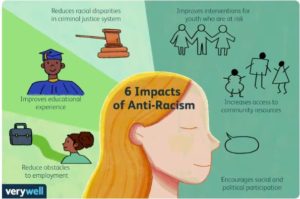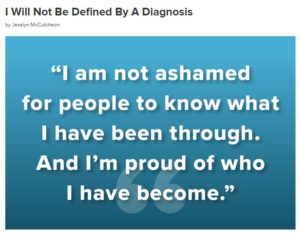According to Dictionary.com, stigma is “a mark of disgrace or infamy; a stain or reproach, as on one’s reputation.” Stigma can be the result of various circumstances or events in someone’s life, such as the stigma of being an ex-convict, HIV positive, and so on. I will focus on the stigma associated with being diagnosed with mental illness and substance use disorders in this blog.
Most conversations about people living with mental illness or substance use disorders will include stigma. Unfortunately, many people who have not been on the receiving end of stigma, whether firsthand or secondhand through the stigmatizing of a loved-one, fear people with mental illness or substance use disorders. This fear easily morphs into anger, which then leads to marginalizing, criminalizing, and ostracizing those they do not understand. Sid’s House adopted the motto: “The solution is understanding.” When we seek to understand someone or something, our fear withers and our compassion grows. It is difficult to pin-down the origins of stigma, but I am certain fear, based on misguided words and actions meant to protect “normal” (Who defines normal?) people from the scary “others,” lies beneath the surface.
Examples of stigma include but are not limited to
- Media depictions of villains as people living with mental illness or substance use,
- Perpetuating harmful stereotypes of people living with mental illness and substance use: “psycho,” “maniac,” “junkie,” “dope-head,” etc.,
- Discriminating against people living with mental illness or addiction, after they have “done their time” and demonstrate they are living in long-term recovery, by barring them from job opportunities or volunteer activities.
The effects of stigma are profound and potentially life-threatening. Stigma can cause intense shame in those living with mental illness or addiction. The shame can become so intense that suffering people will not seek help due to the stigmatic backlash of being labelled as someone with a disorder. When this happens, they will suffer alone, in silence, until the pain overcomes their coping skills. In fact, people who suffer from mental illness or substance use disorders are much more likely to commit suicide or be victims of homicide than they are to perpetrate violence on others. NCBI/resources
Mental illness is just that: an illness or disorder, affecting the brain, mind, and the body. And, in case someone is thinking addiction is a moral weakness or failing, please note: that viewpoint is an archaic assumption rooted in misunderstanding and fear. Addiction is a brain disease: “At its core, addiction isn’t just a social problem or a moral problem or a criminal problem. It’s a brain problem whose behaviors manifest in all these other areas”…the disease is about brains, not drugs. (Partnership to End Addiction).
Blaming and stigmatizing people for disorders they have no control over is absurd. Perhaps a few people are cruel and unemphatic enough to blame people suffering from diabetes, cancer, or heart disease for contracting such medical disorders. But most people agree: stigmatizing people suffering from physical diseases is cruel and absurd. Why? Because they understand that medical disorders are nonselective and can affect anyone regardless of race, color, creed, sexual orientation, socioeconomic status, or behavioral choices.
Then why do a multitude of people stigmatize other people who are living with mental illness or substance use disorders? The one-word answer is “misunderstanding,” which leads to fear and judgement directed at who and what they do not understand. Again, “The solution (to stigma) is understanding.” Before understanding can occur, one must first be willing to suspend judgement. Another blog might not adequately cover the discipline required to suspend judgement, so I will not try to tackle it here, but when judgement is present, understanding is absent.
If you are still reading, you understand stigma, what it is and the harm it causes. The next step is to take a short quiz to determine if you are prone to stigmatizing people living with mental illness or substance use disorders. Please be honest with yourself; no one needs to know your score. Here is a link to a short quiz on the National Alliance on Mental Illness (NAMI) website: stigmafreequiz
Now that you have taken the quiz, it’s time to talk about ways to recognize and reduce stigma. Since change always begins with self-awareness, let’s take a look at how language can create stigma.
The words and terms listed below are examples of hurtful language used to describe people living with mental illness or addiction:
- Mentally ill
- Emotionally disturbed
- Insane
- Looney
- Deranged
- Addict
- Drug abuser
- Clean
- Dirty
- Alcoholic
Here is a list of alternatives that are not as hurtful or stigmatizing:
- Someone with a mental health challenge
- Person with a mental health disability
- Someone living with depression
- Person suffering from schizophrenia
- Someone with substance use disorder
- Person in recovery, person living in recovery.
- Someone with alcoholic disorder
Did you notice the list of alternatives do not label the person as his or her disorder? These terms are called “person-first” or “person-centered” language. How would it sound if we called people with a cancer diagnosis “cancerous”? Or maybe a person who tests positive for COVID-19 is called a “COVIDER.” Absurd! Then why do we label people with unseen and misunderstood diseases as their particular disease? It’s easy to see how this dehumanizes them. Seek to understand, not to judge what you do not understand.
Don’t be afraid of those living with unseen disorders. They may behave in strange and seemingly erratic ways when their symptoms are severe, but fearing them and judging them based on such episodes leads to more isolation, ostracizing, and stigmatizing. Remember, they are no more prone to violence than those lucky enough to be labelled “normal.”
Once you have done your own work to raise your awareness, understanding, and compassion, become an advocate for those living with unseen disorders and facing the unrelenting backlash of stigma. How do I become an advocate, you may be asking? After educating yourself and becoming comfortable with your own understanding and compassion, you are now in a position to, gently and politely, speak-up and educate family, friends, or even strangers who are using language or acting in ways that stigmatize others.
Finally, if you are a person living in recovery, “reach-back” and help others who are living in dark places where you once dwelled. Holding them accountable for their actions is part of that “reaching-back,” but looking down on them just because they are not where you are in your recovery only ostracizes and stigmatizes them. As a person living in recovery, I understand how easy it is to fall into that trap, and I know there is a fine line between helping and enabling. But, at the same time, I recall what was like to face stigma. I accept responsibility for my actions, but I know I would have sought help sooner if I had not had to face the insidious absurdity of stigma. People, we are better when we see ourselves in others and support instead of judge those we do not understand.

